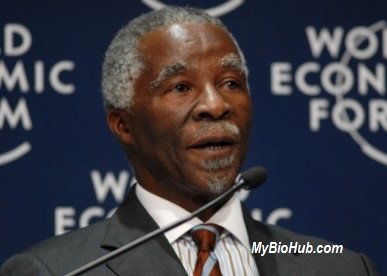Thabo Mvuyelwa Mbeki was born on 18 June, 1942 and raised in Mbewuleni, Cape Province, Union of South Africa, he is one of four children of Epainette and Govan Mbeki. The economist Moeletsi Mbeki is one of his brothers. His father was a stalwart of the African National Congress (ANC) and the South African Communist Party. He is a native Xhosa speaker. His parents were both teachers and activists in a rural area of strength to the African National Congress, and Mbeki describes himself as “born into the struggle”; a portrait of Karl Marx sat on the family mantelpiece, and a portrait of Mohandas Gandhi was on the wall. at age 16, Mbeki, had a child with Olive Mpahlwa named Monwabise Kwanda who disappeared in 1981 with Thabo’s youngest brother Jama. On November 23, 1974, Mbeki married his wife Zanele (née Dlamini) at Farnham Castle in the United Kingdom.
He is a South African politician who served as the second post-apartheid President of South Africa from 14 June 1999 to 24 September 2008. On 20 September 2008, with about nine months left in his second term, he announced his resignation after being recalled by the National Executive Committee of the ANC, following a conclusion by judge C. R. Nicholson of improper interference in the National Prosecuting Authority (NPA), including the prosecution of Jacob Zuma for corruption. On 12 January 2009, the Supreme Court of Appeal unanimously overturned judge Nicholson’s judgment but the resignation stood.
Mbeki has mediated in difficult and complex issues on the African continent including Burundi, Democratic Republic of Congo (DRC), Ivory Coast, and some important peace agreements. He oversaw the transition from the Organisation of African Unity (OAU) to the African Union (AU). His “quiet diplomacy” in Zimbabwe, however, is blamed for protracting the survival of Robert Mugabe’s regime at the cost of thousands of lives and intense economic pressure on Zimbabwe’s neighbors. He became a vocal leader of the Non-Aligned Movement in the United Nations, and, while leveraging South Africa’s seat on the Security Council, he agitated for reform of that body.
His exile story; After the banning of the ANC, the organisation decided it would be better for Mbeki to go into exile. In 1962, him and a group of comrades left South Africa disguised as a football team. They traveled in a minibus to Botswana and flew from there to Tanzania, where Mbeki accompanied Kenneth Kaunda, who later became Zambia’s post-independence president, to London.



